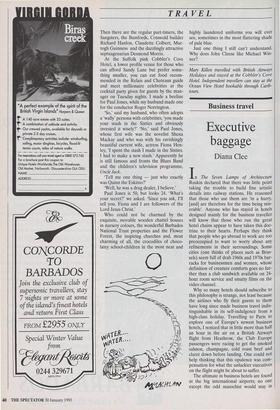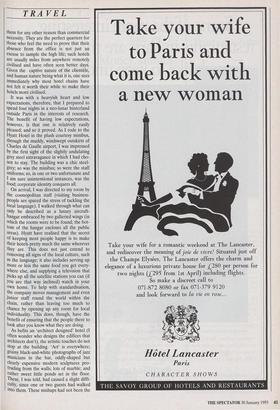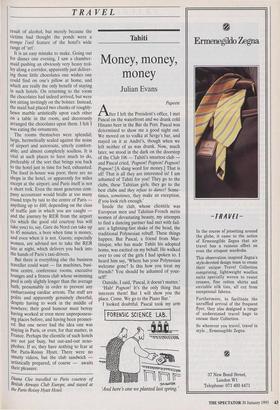Business travel
Executive baggage
Diana Clee
In The Seven Lamps of Architecture Ruskin declared that there was little point taking the trouble to build fine artistic details into railway stations. He reasoned that those who use them are 'in a hurry, [and] are therefore for the time being mis- erable'. Anyone who has stayed in hotels designed mainly for the business traveller will know that those who run the great hotel chains appear to have taken this doc- trine to their hearts. Perhaps they think that people who go abroad to work are too preoccupied to want to worry about any refinements in their surroundings. Some cities (one thinks of places such as Brus- sels) seem full of drab 1960s and 1970s bar- racks for businessmen and women, whose definition of creature comforts goes no fur- ther than a club sandwich available on 24- hour room service and smutty films on the video channel.
Why so many hotels should subscribe to this philosophy is strange, not least because the airlines who fly their guests to them have long since made business travel indis- tinguishable in its self-indulgence from a high-class holiday. Travelling to Paris to explore one of Europe's newest business hotels, I noticed that in little more than half an hour in the air on a British Airways flight from Heathrow, the Club Europe passengers were racing to get the smoked salmon, champagne, cold roast beef and claret down before landing. One could not help thinking that this opulence was com- pensation for what the unluckier executives on the flight might be about to suffer.
The ultimate in business hotels are found at the big international airports; no one except the odd masochist would stay in them for any other reason than commercial necessity. They are the perfect quarters for those who feel the need to prove that their absence from the office is not just an excuse to sample the high life; such hotels are usually miles from anywhere remotely civilised and have often seen better days. Given the captive nature of the clientele, and human nature being what it is, one sees Immediately why most hotel chains have not felt it worth their while to make their hotels more civilised.
It was with a heavyish heart and low expectations, therefore, that I prepared to spend four nights in a neo-lunar hinterland outside Paris in the interests of research. The benefit of having low expectations, however, is that one is relatively easily pleased; and so it proved. As I rode to the Hyatt Hotel in the plush courtesy minibus, through the muddy, windswept outskirts of Charles de Gaulle airport, I was impressed by the first sight of the slightly undulating grey steel extravagance in which I had cho- sen to stay. The building was a chic steel- grey; so was the minibus; so were the staff uniforms; so, in one or two unfortunate and I am sure unintentional instances, was the food; corporate identity conquers all.
On arrival, I was directed to my room by the cosmopolitan staff (visiting business- people are spared the stress of tackling the local language). I walked through what can only be described as a luxury aircraft- hangar embraced by two galleried wings (in which the rooms were to be found; the bot- tom of the hangar encloses all the public areas). Hyatt have realised that the secret of keeping most people happy is to make their hotels pretty much the same wherever they are. This does not just extend to removing all signs of the local culture, such as the language; it also includes serving up more or less the same food you get every- where else, and supplying a television that Picks up all the satellite stations you can (if you are that way inclined) watch in your own home. To help with standardisation, the company moves management and even Junior staff round the world within the chain, rather than leaving too much to chance by opening up any room for local individuality. This does, though, have the benefit of ensuring that the people there to look after you know what they are doing.
As befits an 'architect designed' hotel (I often wonder who designs the edifices that architects don't), the artistic touches do not stop at the building. 'Art' is everywhere; grainy black-and-white photographs of jazz musicians in the bar, oddly-shaped but clearly expensive modern sculptures pro- truding from the walls; lots of marble; and rather sweet little ponds set in the floor. These, I was told, had caused a slight diffi- culty, since one or two guests had walked Into them. These mishaps had not been the result of alcohol, but merely because the victims had thought the ponds were a trompe l'oeil feature of the hotel's wide range of 'art'.
It is an easy mistake to make. Going out for dinner one evening, I saw a chamber- maid pushing an obviously very heavy trol- ley along a corridor, apparently just deliver- ing those little chocolates one wishes one could find on one's pillow at home, and which are really the only benefit of staying in such hotels. On returning to the room the chocolates had indeed arrived, but were not sitting invitingly on the bolster. Instead, the maid had placed two chunks of roughly- hewn marble artistically upon each other on a table in the room, and decorously arranged the chocolates upon them. I felt I was eating the ornaments.
The rooms themselves were splendid; large, hermetically sealed against the noise of airport and autoroute, utterly comfort- able; and almost completely soulless. It is vital at such places to have much to do, preferably of the sort that brings you back to the hotel just in time for bed, exhausted. The food in-house was poor; there are no shops in the hotel, or apparently for miles except at the airport; and Paris itself is not a short trek. Even the most generous com- pany accountant would bridle at too many round trips by taxi to the centre of Paris anything up to £60, depending on the class of traffic jam in which you are caught and the journey by RER from the airport (to which the good old courtesy bus will take you) to, say, Gare du Nord can take up to 45 minutes, a bore when time is money, and even when it is not. Guests, especially Women, are advised not to take the RER late at night, which delivers you back into the hands of Paris's taxi-drivers.
But there is everything else the business traveller could want — fax machines, busi- ness centre, conference rooms, executive lounges and a fitness club whose swimming pool is only slightly longer than the average bath, presumably in order to prevent any embarrassing cardiac arrests. The staff are polite and apparently genuinely cheerful, despite having to work in the middle of nowhere; their good humour must betray having worked at even more unprepossess- ing places before, and having been promot- ed. But one never had the idea one was staying in Paris, or even, for that matter, in France. Perhaps the clientele of such hotels are not just busy, but out-and-out xeno- phobes. If so, they have nothing to fear at the Paris-Roissy Hyatt. There were no smutty videos, but the club sandwich artistically prepared, of course — awaits their pleasure.
Diana Clee travelled to Paris courtesy of British Airways Club Europe, and stayed at the Paris-Roissy Hyatt Hotel.












































































 Previous page
Previous page